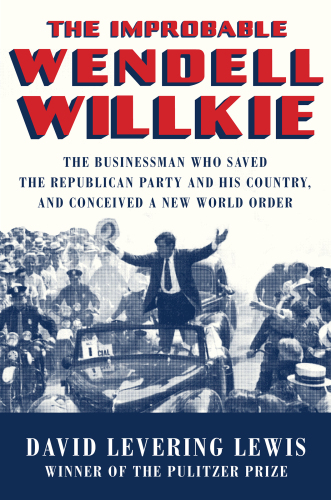
The Improbable Wendell Willkie
The Businessman Who Saved the Republican Party and His Country, and Conceived a New World Order
کتاب های مرتبط
- اطلاعات
- نقد و بررسی
- دیدگاه کاربران
نقد و بررسی

December 1, 2017
Two-time Pulitzer Prize winner Lewis refines our perception of Wendell Willkie, the Republican candidate for president in 1940, showing that not only was Willkie an opponent of isolationism and the first presidential candidate to speak before the NAACP but that he advocated the bipartisanship needed today.
Copyright 2017 Library Journal, LLC Used with permission.

July 15, 2018
The story of a dynamic political outsider who mounted a formidable challenge to Franklin D. Roosevelt for the presidency.In 1940, Roosevelt was deciding whether to run for a third term, a war in Europe was raging, inflaming debate about whether the U.S. should join, and the Republican Party was looking desperately for a candidate who could take back the presidency. The man they chose was Indiana-born Wendell Willkie (1892-1944), a wealthy businessman with no political experience but considerable charm and who only recently had changed party affiliation. "He'll go down as the darkest horse in the stable for 1940," said one political commentator. Pulitzer Prize-winning historian Lewis (Emeritus, History/New York Univ.; W.E.B. Du Bois: A Biography, 2009, etc.), who was awarded the National Humanities Medal, draws on abundant archival and published material to create a spirited portrait of the charismatic, outspoken Willkie, who took the political spotlight from 1940 until his death four years later. Time magazine founder Henry Luce called Willkie "a force of nature"; decades later, historian David Halberstam characterized him as "the rarest of things in those days, a Republican with sex appeal." Willkie was forthright in his criticism of FDR, who Willkie claimed curtailed the Bill of Rights, fomented class conflict, undermined business (as president of a major utility company, Willkie was a fierce opponent of the Tennessee Valley Authority and other New Deal programs), and was itching to involve America in another war. Willkie felt no party loyalty but, Lewis asserts, embraced a "creed of liberalism" that "opposed equally unregulated wealth and unlimited government power." He drew exuberant crowds as he campaigned across the country, and polls showed the election too close to call. Willkie lost to FDR but only by 5 million votes. Post-election, Willkie and FDR became close allies, and after he returned from a fact-finding trip to Europe at FDR's request, Willkie became a strong interventionist. Lewis recounts Willkie's prescient views of the postwar world as well as his staunch civil rights advocacy.A thoroughly researched biography of a remarkable figure.
COPYRIGHT(2018) Kirkus Reviews, ALL RIGHTS RESERVED.

July 23, 2018
Two-time Pulitzer Prize–winning biographer Lewis (God’s Crucible) breathes new life into the onetime Republican standard bearer and now historical footnote. In folksy prose, Lewis tracks Willkie’s evolution from small-town Indiana Wilsonian Democrat to utility company executive, then to, in Lewis’s description, “certainly one of the most unexpected, if not unlikely, candidates for presidency” ever on the Republican ticket. The bulk of the narrative focuses on Willkie’s approximately five years of national prominence, from his 1939 appearance on the cover of Time magazine for his role in challenging New Deal policies to his death in October 1944 at age 52 after an unsuccessful second bid for the GOP nomination. Lewis highlights Willkie’s role in gaining Republican support for the Lend-Lease Act and supporting the nascent civil rights movement. Those looking for parallels to recent elections featuring moguls-turned-politicians will be disappointed; Willkie took a globalist stance and favored bipartisanship to further his political missions. Lewis does not shed much light on Willkie’s personal relationships, but his swift, thoughtful biography makes clear Willkie’s importance in WWII-era America and his lasting impact on domestic and international policies.

























دیدگاه کاربران